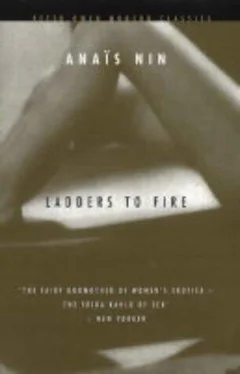Anaïs Nin - Ladders to Fire
Здесь есть возможность читать онлайн «Anaïs Nin - Ladders to Fire» весь текст электронной книги совершенно бесплатно (целиком полную версию без сокращений). В некоторых случаях можно слушать аудио, скачать через торрент в формате fb2 и присутствует краткое содержание. Год выпуска: 2004, ISBN: 2004, Издательство: Peter Owen Limited, Жанр: Классическая проза, Эротические любовные романы, на английском языке. Описание произведения, (предисловие) а так же отзывы посетителей доступны на портале библиотеки ЛибКат.
- Название:Ladders to Fire
- Автор:
- Издательство:Peter Owen Limited
- Жанр:
- Год:2004
- ISBN:9780720611625
- Рейтинг книги:5 / 5. Голосов: 1
-
Избранное:Добавить в избранное
- Отзывы:
-
Ваша оценка:
- 100
- 1
- 2
- 3
- 4
- 5
Ladders to Fire: краткое содержание, описание и аннотация
Предлагаем к чтению аннотацию, описание, краткое содержание или предисловие (зависит от того, что написал сам автор книги «Ladders to Fire»). Если вы не нашли необходимую информацию о книге — напишите в комментариях, мы постараемся отыскать её.
Cities of the Interior
Children of the Albatross
The Four-Chambered Heart
A Spy in the House of Love
Solar Barque
Ladders to Fire — читать онлайн бесплатно полную книгу (весь текст) целиком
Ниже представлен текст книги, разбитый по страницам. Система сохранения места последней прочитанной страницы, позволяет с удобством читать онлайн бесплатно книгу «Ladders to Fire», без необходимости каждый раз заново искать на чём Вы остановились. Поставьте закладку, и сможете в любой момент перейти на страницу, на которой закончили чтение.
Интервал:
Закладка:
“You will save me,” said Lillian always, clinging.
Lillian was the large foundering ship, yes, and Djuna the small lifeboat. But now the big ship had been moored to the small lifeboat and was pitching too fast and furiously and the lifeboat was being swamped.
(She wants something of me that only a man can give her. But first of all she wants to become me, so that she can communicate with man. She has lost her ways of communicating with man. She is doing it through me!)
When they walked together, Lillian sometimes asked Djuna: “Walk in front of me, so I can see how you walk. You have such a sway of the hips!”
In front of Lillian walked Lillian’s lost femininity, imprisoned in the male Lillian. Lillian’s femininity imprisoned in the deepest wells of her being, loving Djuna, and knowing it must reach her own femininity at the bottom of the well by way of Djuna. By wearing Djuna’s feminine exterior, swaying her hips, becoming Djuna.
As Djuna enjoyed Lillian’s violence, Lillian enjoyed Djuna’s feminine capitulations. The pleasure Djuna took in her capitulations to love, to desire. Lillian breathed out through Djuna. What took place in Djuna’s being which Lillian could not reach, she at least reached by way of Djuna.
“The first time a boy hurt me,” said Lillian to Djuna, “it was in school. I don’t remember what he did. But I wept. And he laughed at me. Do you know what I did? I went home and dressed in my brother’s suit. I tried to feel as the boy felt. Naturally as I put on the suit I felt I was putting on a costume of strength. It made me feel sure, as the boy was, confident, impudent. The mere fact of putting my hands in the pockets made me feel arrogant. I thought then that to be a boy mt one did not suffer. That it was being a girl that was responsible for the suffering. Later I felt the same way. I thought man had found a way out of suffering by objectivity. What the man called being reasonable. When my husband said: Lillian, let’s be reasonable, it meant he had none of the feeling I had, that he could be objective. What a power! Then there was another thing. When I felt his great choking anguish I discovered one relief, and that was action. I felt like the women who had to sit and wait at home while there was a war going on. I felt if only I could join the war, participate, I wouldn’t feel the anguish and the fear. All through the last war as a child I felt: if only they would let me be Joan of Arc. Joan of Arc wore a suit of armor, she sat on a horse, she fought side by side with the men. She must have gained their strength. Then it was the same way about men. At a dance, as a girl, the moment of waiting before they asked me seemed intolerable, the suspense, and the insecurity; perhaps they were not going to ask me! So I rushed forward, to cut the suspense. I rushed. All my nature became rushed, propelled by the anxiety, merely to cut through all the moment of anxious uncertainty.”
Djuna looked tenderly at her, not the strong Lillian, the overwhelming Lillian, the aggressive Lillian, but the hidden, secret, frightened Lillian who had created such a hard armor and disguise around her weakness.
Djuna saw the Lillian hidden in her coat of armor, and all of Lillian’s armor lay broken around her, like cruel pieces of mail which had wounded her more than they had protected her from the enemy. The mail had melted, and revealed the bruised feminine flesh. At the first knowledge of the weakness Lillian had picked up the mail, wrapped herself in it and had taken up a lance. The lance! The man’s lance. Uncertainty resolved, relieved by the activity of attack!
The body of Lillian changed as she talked, the fast coming words accelerating the dismantling. She was taking off the shell, the covering, the defenses, the coat of mail, the activity.
Suddenly Lillian laughed. In the middle of tears, she laughed: “I’m remembering a very comical incident. I was about sixteen. There was a boy in love with me. Shyly, quietly in love. We were in the same school but he lived quite far away. We all used bicycles. One day we were going to be separated for a week by the holidays. He suggested we both bicycle together towards a meeting place between the two towns. The week of separation seemed too unbearable. So it was agreed: at a certain hour we would leave the house together and meet half way.”
Lillian started off. At first at a normal pace. She knew the rhythm of the boy. A rather easy, relaxed rhythm. Never rushed. Never precipitate. She at first adopted his rhythm. Dreaming of him, of his slow smile, of his shy worship, of his expression of this worship, which consisted mainly in waiting for her here, there. Waiting. Not advancing, inviting, but waiting. Watching her pass by.
She pedaled slowly, dreamily. Then slowly her pleasure and tranquility turned to anguish: suppose he did not come? Suppose she arrived before him? Could she bear the sight of the desolate place of their meeting, the failed meeting? The exaltation that had been increasing in her, like some powerful motor, what could she do with this exaltation if she arrived alone, and the meeting failed? The fear affected her in two directions. She could stop right there, and turn back, and not face the possibility of disaointment, or she could rush forward and accelerate the moment of painful suspense, and she chose the second. Her lack of confidence in life, in realization, in the fulfillment of her desires, in the outcome of a dream, in the possibility of reality corresponding to her fantasy, speeded her bicycle with the incredible speed of anxiety, a speed beyond the human body, beyond human endurance.
She arrived before him. Her fear was justified! She could not measure what the anxiety had done to her speed, the acceleration which had broken the equality of rhythm. She arrived as she had feared, at a desolate spot on the road, and the boy had become this invisible image which taunts the dreamer, a mirage that could not be made real. It had become reality eluding the dreamer, the wish unfulfilled.
The boy may have arrived later. He may have fallen asleep and not come at all. He may have had a tire puncture. Nothing mattered. Nothing could prevent her from feeling that she was not Juliet waiting on the balcony, but Romeo who had to leap across space to join her. She had leaped, she had acted Romeo, and when woman leaped she leaped into a void.
Later it was not the drama of two bicycles, of a road, of two separated towns; later it was a darkened room, and a man and woman pursuing pleasure and fusion.
At first she lay passive dreaming of the pleasure that would come out of the darkness, to dissolve and invade her. But it was not pleasure which came out of the darkness to clasp her. It was anxiety. Anxiety made confused gestures in the dark, crosscurrents of forces, short circuits, and no pleasure. A depression, a broken rhythm, a feeling such as men must have after they have taken a whore.
Out of the prone figure of the woman, apparently passive, apparently receptive, there rose a taut and anxious shadow, the shadow of the woman bicycling too fast; who, to relieve her insecurity, plunges forward as the desperado does and is defeated because this aggressiveness cannot meet its mate and unite with it. A part of the woman has not participated in this marriage, has not been taken. But was it a part of the woman, or the shadow of anxiety, which dressed itself in man’s clothes and assumed man’s active role to quiet its anguish? Wasn’t it the woman who dressed as a man and pedaled too fast?
Jay. The table at which he sat was stained with wine. His blue eyes were inscrutable like those of a Chinese sage. He ended all his phrases in a kind of hum, as if he put his foot on the pedal of his voice and created an echo. In this way none of his phrases ended abruptly.
Читать дальшеИнтервал:
Закладка:
Похожие книги на «Ladders to Fire»
Представляем Вашему вниманию похожие книги на «Ladders to Fire» списком для выбора. Мы отобрали схожую по названию и смыслу литературу в надежде предоставить читателям больше вариантов отыскать новые, интересные, ещё непрочитанные произведения.
Обсуждение, отзывы о книге «Ladders to Fire» и просто собственные мнения читателей. Оставьте ваши комментарии, напишите, что Вы думаете о произведении, его смысле или главных героях. Укажите что конкретно понравилось, а что нет, и почему Вы так считаете.












